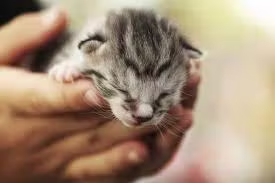Understanding and Addressing Fading Kitten Syndrome in Cats

Author: Vejay Anand
Witnessing newborn kittens face health challenges can be heartbreaking for cat owners and rescuers, especially when the cause of their decline is unclear. Fading Kitten Syndrome, or failure to thrive, presents a collection of signs indicating rapidly declining health in newborn kittens. Feline Neonatal Isoerythrolysis (FNI) is a significant threat during the first week of life, with up to 90% of feline deaths. It's similar to Sudden Infant Death Syndrome (SIDS) in human babies.
Recognizing the Signs:
Identifying the symptoms of Fading Kitten Syndrome is crucial for caregivers, as early detection can enhance the chances of survival. These symptoms include low birth weight, lethargy, difficulty nursing, vomiting, and hypothermia. Often, affected kittens are the smallest in the litter, struggling to nurse and failing to receive essential nutrients like colostrum during the first 72 hours after birth.
Causes and Contributing Factors:
While the exact causes of Fading Kitten Syndrome remain elusive, several factors contribute to its development. Malnutrition and disease in the mother cat, congenital disabilities, infectious infections, neonatal isoerythrolysis, and parasitic infestations can all play a role in the onset of this syndrome. Addressing these factors requires vigilance and early intervention.
What To Do if You Suspect Fading Kitten Syndrome:
If you observe signs of illness in a young kitten, it's crucial to contact your veterinarian promptly. Fading kittens may decline rapidly, and early detection increases the chances of recovery. Veterinary examinations and diagnostic tests can help determine the cause, and supportive care, including fluid therapy and medications, may be prescribed based on the diagnosis.
Treatment and Prevention:
Unfortunately, the prognosis for kittens with fading kitten syndrome is often guarded, and despite treatment, many may not survive. While there is no foolproof method to prevent this syndrome, maintaining the health of pregnant cats and providing proper care can improve the overall well-being of the litter.
Coping and Moving Forward:
If a fading kitten doesn't survive, acknowledging that you did your best and directing attention to the mother cat's and other kittens' health is essential. Fostering a supportive environment and seeking prompt veterinary care for any signs of illness contribute to the well-being of the feline family.
Navigate the challenges of Fading Kitten Syndrome with knowledge, compassion, and proactive care for a better chance at the health and survival of newborn kittens.

